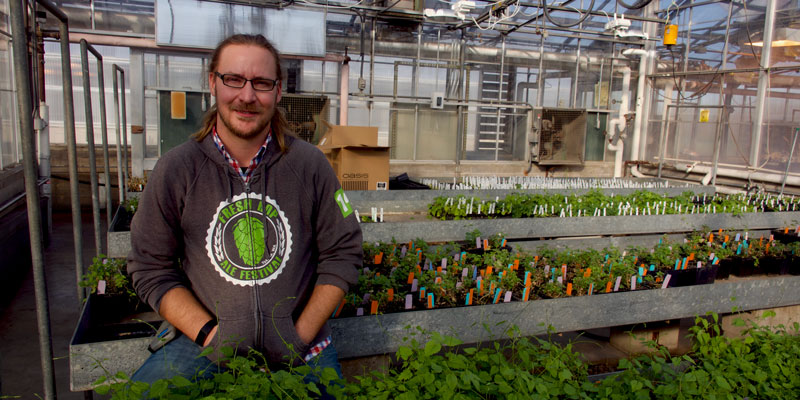A third year PhD student in Plant and Microbial Biology, Joshua Havill is trying to save hops… and thus beer. He started studying hop powdery mildew, a poorly-understood disease that plagues hop growers, as an undergraduate transfer student.

Lab: Muehlbauer Lab
Entered Program: Summer 2017
Hometown: Copperas Cove, TX
Describe the focus of your PhD work.
In recent years, hop production has increased dramatically in the midwest and eastern US. Unlike the Pacific Northwest, where hop growers have multiple generations of knowledge about the crop and pests, most midwestern and eastern growers are unfamiliar with hop production. There’s a lack of knowledge around production and diseases, like hop powdery mildew. It’s a disease wreaking havoc on hop crops. The aim of my dissertation research is to identify and characterize resistance to hop powdery mildew across many different varieties of the common hop species. Once we identify genes for novel and robust resistance, we hope to develop elite breeding varieties. We’ll also identify the ‘resistant’ genes with genetic markers so we can keep track of those genes over time while breeding new varieties in the future.
What drew you to study diseases of hops?
The major tipping point happened when I transferred to the U as an undergraduate student from Minneapolis Community and Technical College. I wanted to research something other than traditional row crops (corn, soybeans). While learning about ongoing research at the University, I stumbled upon an article about a new hop research program beginning at the Southern Research and Outreach Center in Waseca with Dr. Vince Fritz and Dr. Charlie Rohwer. The research fascinated me and I reached out the researchers expressing my interest. To my surprise, they agreed to take me on as an undergraduate research assistant! My interest in the system only grew from there.
Advice for undergraduate students who transfer and are interested in research?
Take time to reflect on the material you are learning in your courses and think about what interests you. Use those interests to guide your search for an advisor conducting research in that topic area. Take the first step and be persistent. Faculty and graduate students are busy people. If they see an interest from a student and have a position open, they will often find a way to work with the student.
What’s your favorite place to work on campus?
Outside of day-to-day lab or computer work, I routinely spend time in the greenhouse. The best part of the greenhouse is during the winter when it’s bitter subzero temperatures outside but a nice and balmy 80 degrees inside.
Outside of courses and research, what else keeps you busy on campus?
As a graduate research assistant, much of my time on campus is directed specifically at my research. Outside of my research I enjoy attending seminars on a variety of research topics. Otherwise my time is devoted to my family and spending time in nature.